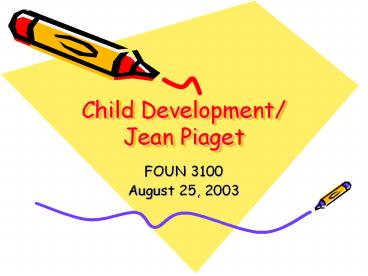Child Development/ Jean Piaget - PowerPoint PPT Presentation
Title:
Child Development/ Jean Piaget
Description:
Child Development/ Jean Piaget FOUN 3100 August 25, 2003 Development Why and What? Child Development in the 16th Century Puritans Children are born evil and have a ... – PowerPoint PPT presentation
Number of Views:460
Avg rating:3.0/5.0
Title: Child Development/ Jean Piaget
1
Child Development/Jean Piaget
- FOUN 3100
- August 25, 2003
2
Development
- Why and What?
3
Child Development in the 16th Century
- Puritans
- Children are born evil and have a natural
tendency toward evil - Children are born without knowledge they are
not aware of their evilness and how to lead a
good life - Teachers/parents must steer children away from
natural tendencies so they could go to Heaven - The New England Primer rote memorization
4
Child Development in the 17th Century
- Jean-Jacques Rousseau (Émile)
- Children morally good
- Stayed that way unless corrupted by society
- Discovery learning teachers/parents should
create environment for children to explore
5
Child Development in the 21st Century
- What is the basis of the modern day ideas of
child development? - Puritans or Rousseau?
6
Why is studying development important?
- The more you know, the more capable you are to
teach - Our society values childhood
- Individual level
- Shared characteristics (psychologists)
7
What is development?
- The pattern of biological, cognitive, and
socioemotional changes that begins at conception
and continues through the life span.
8
Development The Whole Child
Biological
Socioemotional
Cognitive
9
Periods of Development
- Infancy birth to 18 months
- Early childhood 18 months to 6-years-old
- Middle and late childhood6 to 11-years-old
- Adolescence 10 to 18-years-old
- Early adulthood late teens to early 30s
10
Cognitive Processes
- Jean Piaget
- (1896-1980)
11
Piagets Theory
- Piaget was interested in
- how we develop our understanding of the things
around us - How kids come to know day-to-day things adults
take for granted
12
Three Characteristics of Piagets Theory
- Biological model
- Structured theory
- Stages
13
Biological Model
- Piagets education Biology
- Explained development using biological terms
- Example over time our knowledge gets more
advanced and more differentiated as cells do
during prenatal growth
14
Structured Theory
- Interested in how things are organized
- Determined that children do not think in the same
way as adults - Schemas
- Change as we get older
- Assimilation
- Accommodation
- Equilibration
15
Characteristics of Piagets Stages
- Reflect an underlying mental structure
- Describe a person in a state of equilibrium
- Must follow the order developed by Piaget
- Cannot skip stages
- Composed partly of preparation and party of
achievement - Found in all cultures - Universal
16
Piagets Stages of Development
- Sensorimotor Stage birth to 2
- Infants use senses to understand their world
- Object permanence
17
Piagets Stages of Development
- Preoperational Stage 2 to 7
- Increased use of language
- Egocentrism
- Animism
- Centration
- Lack of conservation
- Lack reversibility (operations)
18
Piagets Stages of Development
- Concrete Operational Stage 7 to 11
- Operations
- Logical reasoning only in concrete situations
- Classification
- Seriation
19
Piagets Stages of Development
- Formal Operational Stage 11 15
- More logical thought
- Abstract thought
- Idealistic thought
- Hypothetical-deductive reasoning
20
Strengths of Piagets Theory
- One of the first formal, comprehensive theories
on child development - Children as active, constructive thinkers
- Methodology interested in why kids got wrong
answers - Observation methods
- Cognitive growth partial accomplishments vs.
complete appearance at once
21
Weaknesses of Piagets Theory
- Estimates of time related to childrens
competencies - Development does not always occur in a stage-like
fashion - Children can be trained to be at the next stage































